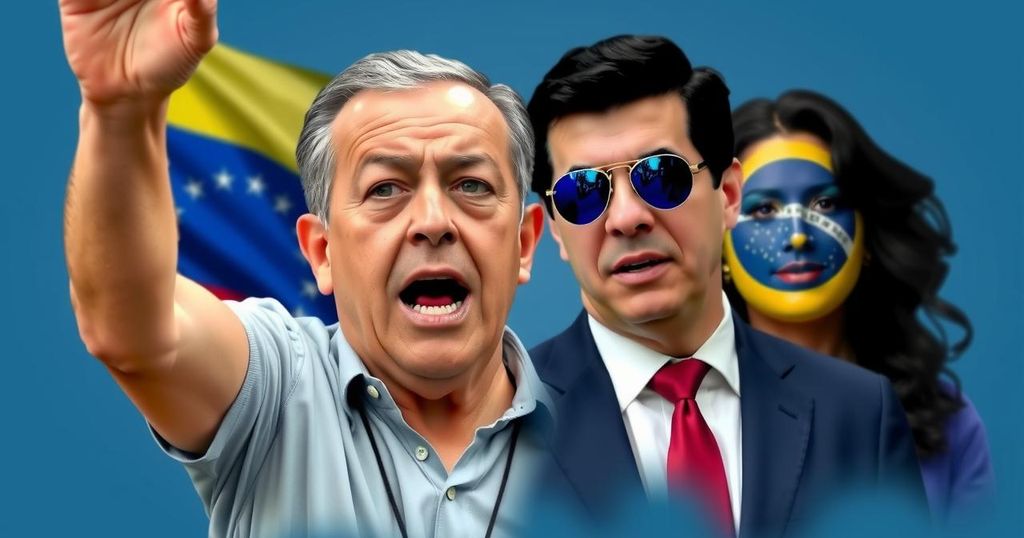Argentina and Brazil Call for Action Amid Venezuelan Opposition Crisis
Six Venezuelan opposition members sheltering in the former Argentine embassy in Caracas are facing heightened harassment, including surveillance and utility disruptions, amidst international calls for their safe passage. The situation stems from a contentious presidential election that has exacerbated Venezuela’s political divide, with Argentina, Brazil, and the OAS pressing for action against Nicolás Maduro’s regime, which dismisses the allegations and continues its oppressive measures.
The ongoing Venezuelan political crisis has escalated, particularly concerning six opposition members who have taken refuge in the former Argentine embassy in Caracas. These individuals, facing significant harassment from the Venezuelan government—including constant surveillance, utility interruptions, and arrests—are calling for international support. The situation has garnered attention from the governments of Argentina and Brazil, as well as the Organization of American States (OAS), all urging for their safe passage amid the backdrop of a disputed presidential election that has further polarized the nation.
Since March of 2024, these opposition figures, including Magalli Meda, campaign manager for María Corina Machado, have dealt with increasingly severe conditions following their flight from political persecution. The transition of custodianship from Argentina to Brazil has added complexity, particularly as Maduro’s regime has resisted outside pressure and revoked Brazil’s oversight of the embassy. Meda has highlighted the dire ambiance, pushing for urgent action to mitigate basic human rights violations occurring within the shelter.
The diplomatic impasse is compounded by the fallout from the contentious July 2024 presidential election, declared in favor of Nicolás Maduro by electoral authorities amidst allegations of fraud and opposition claims citing different vote tallies. This political turmoil has isolated Maduro’s administration regionally, compelling countries like Argentina and Brazil to advocate for the safe exit of the opposition figures. Despite ongoing negotiations led by Brazilian officials, the environment inside the compound continues to deteriorate, urging a call for regional solidarity in addressing the plight of these individuals.
The international law regarding diplomatic premises suggests that the compound is sovereign territory; however, the Venezuelan government’s actions raise serious concerns regarding its compliance with established protocols. As the situation persists, the six opposition members underscore the human cost of Venezuela’s political division and call for the necessary attention and support from global leaders to avert further deterioration.
In conclusion, the plight of Venezuelan opposition figures seeking refuge highlights the broader struggle of democracy in the nation. The collaboration of Argentina and Brazil alongside the OAS symbolizes a concerted effort to reinforce regional pressure on Maduro’s government to allow safe passage for these individuals while addressing the underlying electoral and humanitarian crises. The international community’s involvement may prove pivotal in seeking a resolution to this ongoing conflict and ensuring the rights of all Venezuelans.
The political landscape in Venezuela is fraught with tension, particularly following the disputed presidential elections that took place in July 2024. Both Nicolás Maduro and opposition leader María Corina Machado claim victory, leading to a polarizing environment. The six opposition members taking refuge in the former Argentine embassy represent a microcosm of the wider repression faced by political dissenters in Venezuela. With allegations of fraud surrounding the elections and the Venezuelan government’s continued hostility, the situation remains dire. The actions of Argentina, Brazil, and the OAS signify a response to these escalating tensions, seeking to ensure the safety and rights of opposition figures amidst governmental aggression.
The ongoing humanitarian crisis faced by opposition members in Venezuela is emblematic of the severe political turmoil engulfing the nation. With international actors like Argentina and Brazil stepping in to advocate for safe passage, there exists a glimmer of hope for these beleaguered figures. The situation requires urgent action, not only to protect these individuals but also to uphold democratic principles in Venezuela, and it reflects a crucial juncture where regional cooperation can make a significant impact. The outcome will likely hinge on how effectively the international community can apply pressure to alleviate the oppressive tactics employed by the Maduro administration.
Original Source: www.newslooks.com




Post Comment